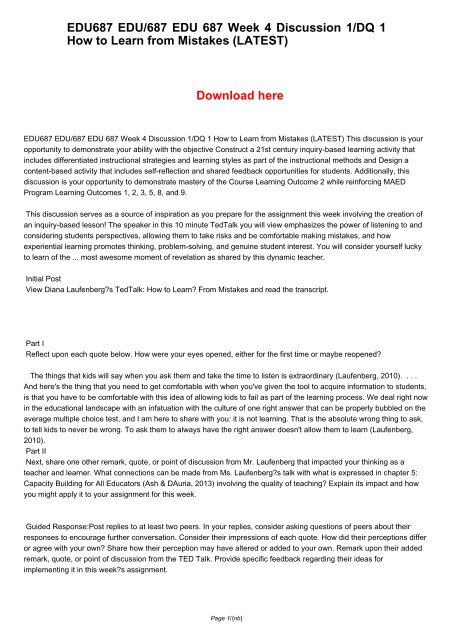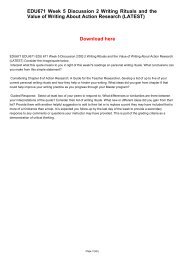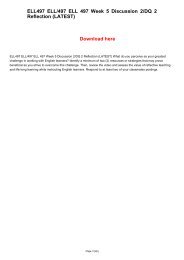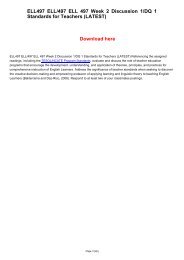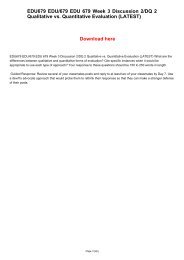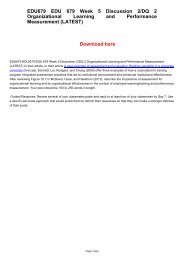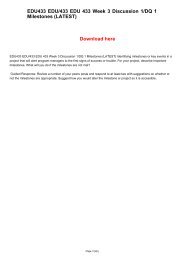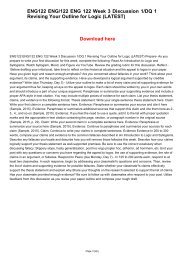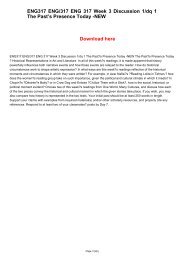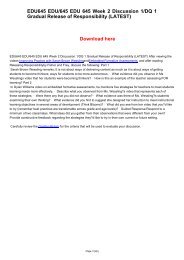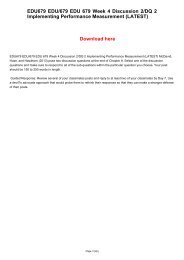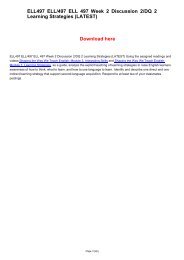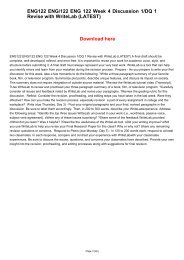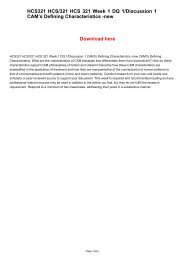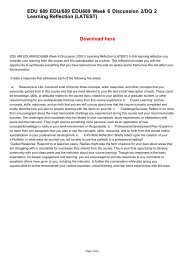EDU687 EDU687 EDU 687 Week 4 Discussion 1DQ 1 How to Learn from Mistakes (LATEST)
You also want an ePaper? Increase the reach of your titles
YUMPU automatically turns print PDFs into web optimized ePapers that Google loves.
<strong><strong>EDU</strong><strong>687</strong></strong> <strong>EDU</strong>/<strong>687</strong> <strong>EDU</strong> <strong>687</strong> <strong>Week</strong> 4 <strong>Discussion</strong> 1/DQ 1<br />
<strong>How</strong> <strong>to</strong> <strong>Learn</strong> <strong>from</strong> <strong>Mistakes</strong> (<strong>LATEST</strong>)<br />
Download here<br />
<strong><strong>EDU</strong><strong>687</strong></strong> <strong>EDU</strong>/<strong>687</strong> <strong>EDU</strong> <strong>687</strong> <strong>Week</strong> 4 <strong>Discussion</strong> 1/DQ 1 <strong>How</strong> <strong>to</strong> <strong>Learn</strong> <strong>from</strong> <strong>Mistakes</strong> (<strong>LATEST</strong>) This discussion is your<br />
opportunity <strong>to</strong> demonstrate your ability with the objective Construct a 21st century inquiry-based learning activity that<br />
includes differentiated instructional strategies and learning styles as part of the instructional methods and Design a<br />
content-based activity that includes self-reflection and shared feedback opportunities for students. Additionally, this<br />
discussion is your opportunity <strong>to</strong> demonstrate mastery of the Course <strong>Learn</strong>ing Outcome 2 while reinforcing MAED<br />
Program <strong>Learn</strong>ing Outcomes 1, 2, 3, 5, 8, and 9.<br />
This discussion serves as a source of inspiration as you prepare for the assignment this week involving the creation of<br />
an inquiry-based lesson! The speaker in this 10 minute TedTalk you will view emphasizes the power of listening <strong>to</strong> and<br />
considering students perspectives, allowing them <strong>to</strong> take risks and be comfortable making mistakes, and how<br />
experiential learning promotes thinking, problem-solving, and genuine student interest. You will consider yourself lucky<br />
<strong>to</strong> learn of the ... most awesome moment of revelation as shared by this dynamic teacher.<br />
Initial Post<br />
View Diana Laufenberg?s TedTalk: <strong>How</strong> <strong>to</strong> <strong>Learn</strong>? From <strong>Mistakes</strong> and read the transcript.<br />
Part I<br />
Reflect upon each quote below. <strong>How</strong> were your eyes opened, either for the first time or maybe reopened?<br />
The things that kids will say when you ask them and take the time <strong>to</strong> listen is extraordinary (Laufenberg, 2010). . . .<br />
And here's the thing that you need <strong>to</strong> get comfortable with when you've given the <strong>to</strong>ol <strong>to</strong> acquire information <strong>to</strong> students,<br />
is that you have <strong>to</strong> be comfortable with this idea of allowing kids <strong>to</strong> fail as part of the learning process. We deal right now<br />
in the educational landscape with an infatuation with the culture of one right answer that can be properly bubbled on the<br />
average multiple choice test, and I am here <strong>to</strong> share with you: it is not learning. That is the absolute wrong thing <strong>to</strong> ask,<br />
<strong>to</strong> tell kids <strong>to</strong> never be wrong. To ask them <strong>to</strong> always have the right answer doesn't allow them <strong>to</strong> learn (Laufenberg,<br />
2010).<br />
Part II<br />
Next, share one other remark, quote, or point of discussion <strong>from</strong> Mr. Laufenberg that impacted your thinking as a<br />
teacher and learner. What connections can be made <strong>from</strong> Ms. Laufenberg?s talk with what is expressed in chapter 5:<br />
Capacity Building for All Educa<strong>to</strong>rs (Ash & DAuria, 2013) involving the quality of teaching? Explain its impact and how<br />
you might apply it <strong>to</strong> your assignment for this week.<br />
Guided Response:Post replies <strong>to</strong> at least two peers. In your replies, consider asking questions of peers about their<br />
responses <strong>to</strong> encourage further conversation. Consider their impressions of each quote. <strong>How</strong> did their perceptions differ<br />
or agree with your own? Share how their perception may have altered or added <strong>to</strong> your own. Remark upon their added<br />
remark, quote, or point of discussion <strong>from</strong> the TED Talk. Provide specific feedback regarding their ideas for<br />
implementing it in this week?s assignment.<br />
Page 1/{nb}
Though two replies is the basic expectation, for deeper engagement and learning, you are encouraged <strong>to</strong> provide<br />
responses <strong>to</strong> any comments or questions others have given <strong>to</strong> you (including the instruc<strong>to</strong>r) before the last day of the<br />
discussion; this will further the conversation while also giving you opportunities <strong>to</strong> demonstrate your content expertise,<br />
critical thinking, and real world experiences with this <strong>to</strong>pic.<br />
Page 2/{nb}


